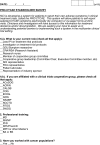Stakeholder perspectives on implementing the National Cancer Institute's patient-reported outcomes version of the Common Terminology Criteria for Adverse Events (PRO-CTCAE)
- PMID: 24073038
- PMCID: PMC3717706
- DOI: 10.1007/s13142-011-0025-3
Stakeholder perspectives on implementing the National Cancer Institute's patient-reported outcomes version of the Common Terminology Criteria for Adverse Events (PRO-CTCAE)
Abstract
The National Cancer Institute (NCI) is developing a patient-reported version of its Common Terminology Criteria for Adverse Events, called the "PRO-CTCAE." The PRO-CTCAE consists of a library of patient-reported items which can be administered in clinical trials to directly capture the patient experience of adverse events during cancer treatment, as well as a software platform for administering these items via computer or telephone. In order to better understand the impressions of stakeholders involved in cancer clinical research about the potential value of the PRO-CTCAE approach to capturing adverse event information in clinical research, as well as their perspectives about barriers and strategies for implementing the PRO-CTCAE in NCI-sponsored cancer trials, a survey was conducted. A survey including structured and open-ended questions was developed to elicit perceptions about the use of patient-reported outcomes (PROs) for adverse event reporting, and to explore logistical considerations for implementing the PRO-CTCAE in cancer trials. The survey was distributed electronically and by paper to a convenience sample of leadership and committee members in the NCI's cooperative group network, including principal investigators, clinical investigators, research nurses, data managers, patient advocates, and representatives of the NCI and Food and Drug Administration. Between October, 2008 through February, 2009, 727 surveys were collected. Most respondents (93%) agreed that patient reporting of adverse symptoms would be useful for improving understanding of the patient experience with treatment in cancer trials, and 88%, 80%, and 76%, respectively, endorsed that administration of PRO-CTCAE items in clinical trials would improve the completeness, accuracy, and efficiency of symptom data collection. More than three fourths believed that patient reports would be useful for informing treatment dose modifications and towards FDA regulatory evaluation of drugs. Eighty-eight percent felt that patients in clinical trials would be willing to self-report adverse symptoms at clinic visits via computer, and 68% felt patients would self-report weekly from home via the internet or an automated telephone system. Lack of computers and limited space and personnel were seen as potential barriers to in-clinic self-reporting, but these were judged to be surmountable with adequate funding. The PRO-CTCAE items and software are viewed by a majority of survey respondents as a means to improve adverse event data quality and comprehensiveness, enhance clinical decision-making, and foster patient-clinician communication. Research is ongoing to assess the measurement properties and feasibility of implementing this measure in cancer clinical trials.
Keywords: Cancer, Clinical trials; Comparative effectiveness research; Cooperative groups; National Cancer Institute; Oncology; Patient-reported outcomes; Symptoms, adverse events; Tolerability; Toxicity, safety.
References
-
- National Cancer Institute, National Institutes of Health, U.S. Department of Health and Human Services. Common Terminology Criteria for Adverse Events (CTCAE) Version 4.0. NIH publication # 09-7473. Published May 29, 2009; Revised Version 4.02 September 15, 2009 (available at http://evs.nci.nih.gov/ftp1/CTCAE/CTCAE_4.03_2010-06-14_QuickReference_5..., last accessed December 30, 2010).
Grants and funding
LinkOut - more resources
Full Text Sources
Miscellaneous


